Un luogo dove postare senza troppe pretese ciò che mi ispira/interessa/colpisce in rete e nel mondo reale.
Don't wanna be here? Send us removal request.
Text
In regards of the Trump government scraping all trans inclusion in its queer information portion of its websites I have made this thing. Spread the word. Don't let them pretend we never existed.
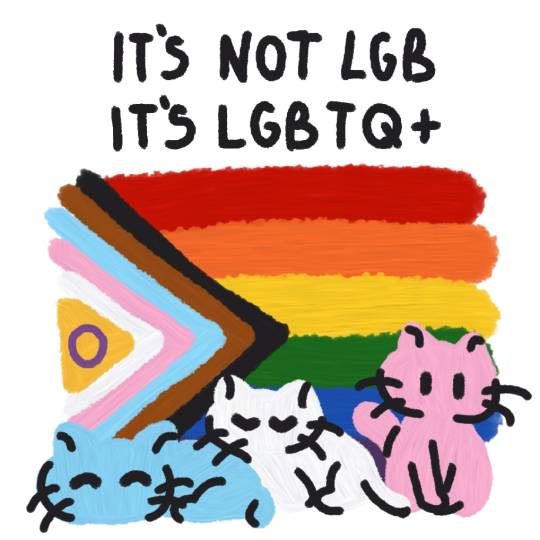

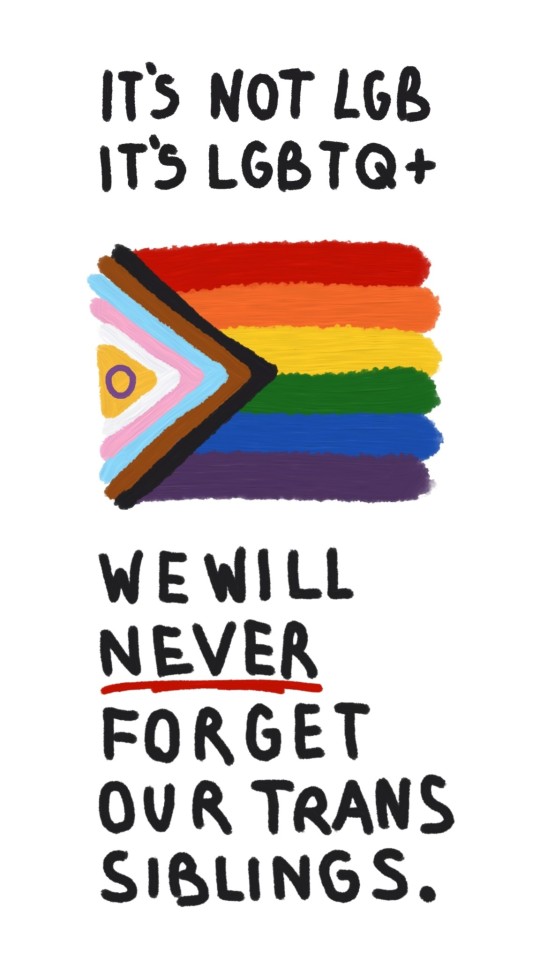
P.S: Don't like! Reblog! <3
EDIT: Well this got a lot of attention! I got a few users asking to print or repost my art and I am unimaginably grateful to everyone's interest, especially since it's a really simple drawing I made on a whim haha! Anyone who is looking to print these out to hang or hand out or repost on another platform is free to do so, although I ask you to credit me and let people know it's from my Tumblr profile! If anyone wishes to do anything else with my art or post and wants to clarify what I consent to then they can message me privately and I'll explain! <333 all my love to my queer siblings
EDIT: I made an LGBTQIA+ version with a focus on trans and intersex folks, it's on my pinned if you prefer this version of the acronym.
102K notes
·
View notes
Text
To me, the craziest thing about this panel isn't the extremely charged handshake, nor the intense eye contact, but rather the perspective.

Furudate is really good at toying with perspective to convey the story's motifs and themes. Here, thanks to the perspective, it looks like the net is above Hinata and Kageyama, when in fact it isn't that tall. In fact, I know it's right between them. But with the way this panel was drawn, it looks like they're facing each other with an unobstructed view.
The imagery here is clear: it doesn't matter that they're on opposite sides of the net now, there's nothing keeping them apart anymore. They stand on even ground, on equal footing, face to face.
3K notes
·
View notes
Text






distracting myself from the political and economic state of the world sorry
2K notes
·
View notes
Text
I saw something in the news today that truly took my breath away. If you have been paying attention to U.S. politics over the past few days, you’ve most likely seen this woman:
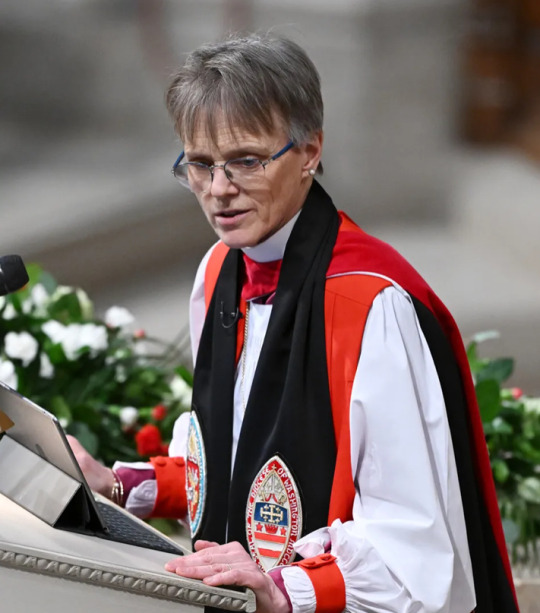
This is Bishop Mariann Budde, and on Monday (Trump’s inauguration) she led an interfaith prayer for Trump and the incoming administration. During the service she asked him to have mercy for LGBTQ+ Americans and undocumented immigrants. This was badly received by the Trump administration (as expected).
After seeing headlines about this woman, I read something that I wanted to share. In 1998 a man named Matthew Shepard was murdered for being gay. I’m not going to get into the details of his death on this post, but please be warned it is extremely triggering if you do choose to read more on your own. Matthew Shepard’s death caused a lot of change in the U.S. regarding how LGBTQ hate crimes are handled, and laws that were passed to protect LGBTQ+ people.
Now you’re probably wondering what Matthew Shepard has to do with an Episcopal bishop. For years after Matthew Shepard’s murder, his family had held onto his remains, too scared to lay him to rest in fear of his final resting place being vandalized. In 2018, Budde had his remains interred at the National Cathedral, which is also the place where the interfaith prayer for Trump and his administration took place. The impact of this really had an effect on me. Budde could have led a non confrontational prayer service, and chosen not to mention the harm that will come to the people Trump and his administration are going after. Instead she chose to call out hate and fear in front of some of the most powerful people on the planet, and at a place that has such a large historic meaning to the LGBTQ community.
In the next few years there will be many challenges in protecting free speech, standing up against hate, and protecting those in our communities. But I would like to believe that for every Donald Trump and Elon Musk, there are people like Marianne Budde. There are those of us who can’t speak up for themselves, so it’s important for those of us who can to amplify our voices, even if it’s not the ‘popular’ thing to do.
“And he said you should apologize. Will you apologize?
I am not going to apologize for asking for mercy for others.” - Mariann Budde’s response in a Time interview
Link to articles: x x x
Link to the Matthew Shepard Foundation if you would like to donate
23K notes
·
View notes
Text
20K notes
·
View notes
Text
ABORTO e GPA REATO UNIVERSALE: come cortocircuitare due porcate messe in piedi da questo governicchio di trogloditi incapaci e reazionari.
#gpa#aborto#provita#governo#giorgia meloni#matteo salvini#antonio tajani#lega#fratelli d'italia#forza italia
0 notes
Text
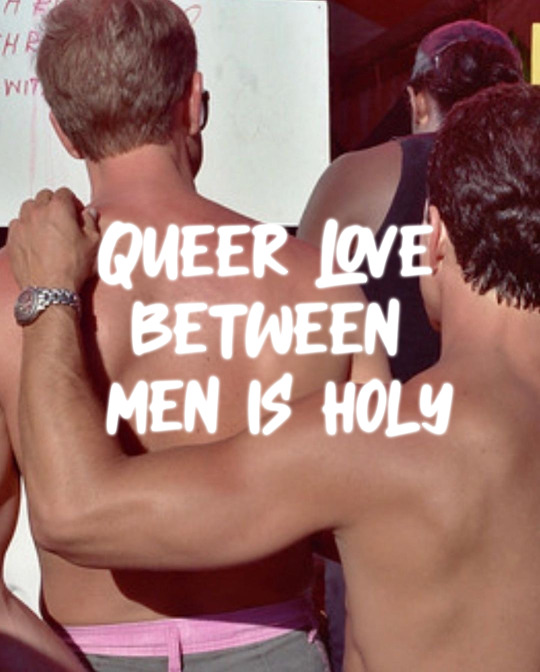
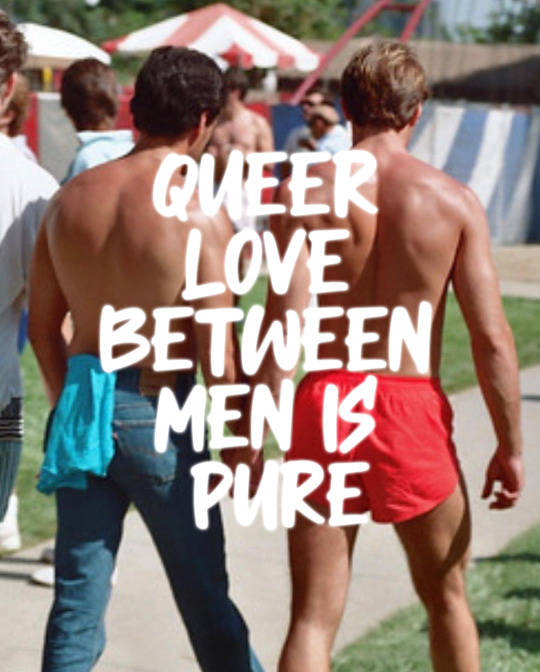
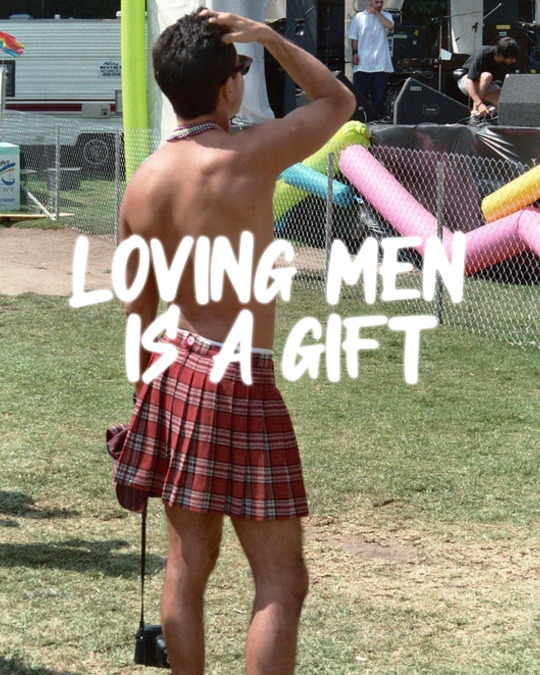
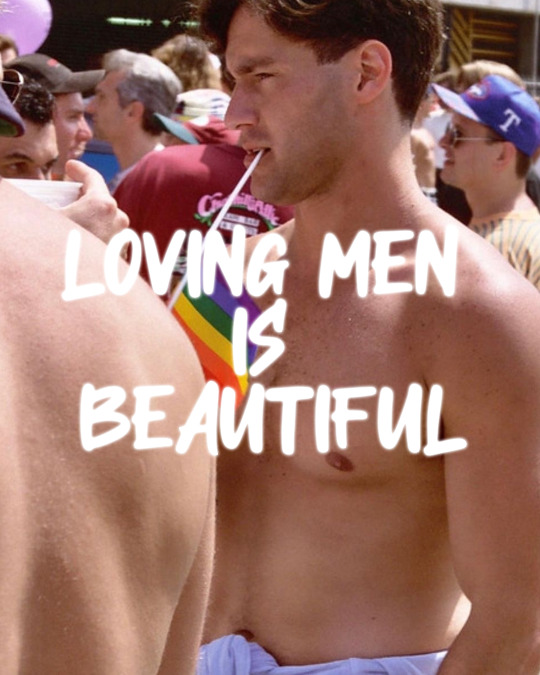
photos taken from west hollywood pride parades (1987-1995) by alan light
4K notes
·
View notes
Text

High school nude swimming, LIFE Magazine October 16 1950
579 notes
·
View notes
Text

In Italia la GpA è reato universale.
Ora anche Lei è una criminale universale, anzi di più perché ha pure lasciato il pianeta portandosi dietro il suo crimine.
4 notes
·
View notes
Text
THIS DAY IN GAY HISTORY
based on: The White Crane Institute's 'Gay Wisdom', Gay Birthdays, Gay For Today, Famous GLBT, glbt-Gay Encylopedia, Today in Gay History, Wikipedia, and more … October 13



1307 – On this date - Friday, October 13, (a date sometimes linked with the origin of the Friday the 13th superstition) the French king Philip IV ordered all French Knights Templar to be arrested. The Templars were charged with numerous heresies and tortured to extract false confessions of blasphemy. The trials were based on these confessions, despite having been obtained under duress. After more bullying from Philip, Pope Clement then issued a Papal Bull on November 22, 1307, which instructed all Christian monarchs in Europe to arrest all Templars and seize their assets.
Brian Lacey, in his book Terrible Queer Creatures: Homosexuality In Irish History writes about how accusations of same sex male relations were used as a weapon in the purging of the Order of the Knights Templar.
The first known homosexual purge in Ireland concerned the Order of Knights Templar, which had been established in Ireland in the 1170s under the auspices of the English King Henry II. The respect for same-sex male relationships, characteristic of the pre-Christian era in Ireland and which carried over well into the Christian epoch, waned as the power of the Catholic Church grew.
The Irish purge was preceeded by the French purge, which had its origins in the desire of the impoverished 14th century French King Philip le Bel (the Fair) to get his hands on the Templars' wealth. Philip had engineered the election of the bishop of Bordeaux to become Pope Clement V on condition that he put an end to the Templars, and Clement duly set up an inquisition in which allegations of homosexuality against the knights were in the foreground. "They were said to have included homosexual acts in their private rituals and to have insisted on sexual intercourse with new recruits," Lacey wrote. "It is an indication of the negative feelings against homosexuality in that period that this could be made as one of the principal charges against such a powerful institution."
The homosexual English King Edward II was ordered by Pope Clement and pressured by the French monarch to seize the Templars' extensive holdings in Ireland, and the Irish Knights Templar were arrested en masse in February 1308. The inquisition opened its trial of the Irish Templars in January 1310 at St. Patrick's Cathedral, Dublin. While only a few of the Knights confessed to the charges of sodomy, the order was abolished and much of its property expropriated.


1926 – John Herbert (d.2001), best known as a playwright, the most prominent of his works being Fortune and Men's Eyes, was born John Herbert Brundage in Toronto and educated there until the age of seventeen.
Herbert was educated at York Memorial Collegiate and various art schools including the National Ballet School. By the age of 18 he was an accomplished drag queen who could pass as a female model at a fashion show but was also subjected to taunts and jeers when he appeared on the streets as his visibly gay male self.
In his 20s, he was mugged on a downtown street. But, when police arrived his attackers accused him of trying to hustle them. Herbert was charged with soliciting, convicted, and imprisoned in the Guelph Reformatory, in Guelph, Ontario. At Guelph he was beaten and raped by other inmates, but that hardly stopped him from exploring drag, wearing dresses and curling his hair in prison.
When he got out, he continued to do Toronto in drag. When one of the officers who charged him several years earlier recognized him one night in a laneway Herbert was hauled off again to jail. Dressing in drag was still a crime in postwar Canada. This time he was sentenced to the Mimico Reformatory outside Toronto.
In the 1950s he attended ballet school, but by the beginning of the next decade had set himself on a creer centered primarily in the theatre. In the early 1960s, he was artistic director of three Toronto companies in succession.
Fortune and Men's Eyes is the 1967 play and 1971 film by John Herbert about a young man's experience in prison, exploring themes of homosexuality and sexual slavery. The title comes from William Shakespeare's Sonnet 29 which begins with the line When in disgrace with fortune and men's eyes. It has been translated into forty languages and produced in over a hundred countries. It is the most published Canadian play, and won the Floyd S. Chalmers Canadian Play Award.

In 1969 the play was produced and directed by Sal Mineo at the Coronet Theatre in Los Angeles. A 1971 film version, directed by Harvey Hart, was filmed in Quebec.
Through the 1970s and early 1980s, Herbert taught in various writing and drama programmes in high schools, universities and other more specialized insitutions, though retaining his primary interest in directing small and alternative theatre companies. For years he helped a small troupe that worked out of the community centre that stands at the heart of Toronto's lesbian/gay "getto".
Over his career, he has been dancer, stage manager, director, designer, teacher, and of course playwright. he has written also Omphale and the Hero (1974), and four gay-themed short plays gathered together as Some Angry Summer Songs (1976). He has also written articles and essays. John died in Toronto in 2001.

I

1929 – Richard Howard's searching and witty poetry, in which homosexuality is not a problem but a solution, is a significant contribution to the gay and lesbian literary heritage.
He was born in Cleveland and educated at Columbia University and the Sorbonne. Currently University Professor of English at the University of Houston and poetry editor of The Paris Review, he is also a distinguished translator and critic. He has translated more than 150 books by French authors—including Charles Baudelaire, André Gide, Jean Cocteau, and Roland Barthes—and he has written incisive accounts of contemporary American poets. But his own searching and witty poetry is his most significant contribution to the gay and lesbian literary heritage.
Apparently born to poor Jewish parents, Howard (whose last name at birth is unknown) was adopted as an infant by Emma Joseph and Harry Orwitz, a middle-class Cleveland couple, who were also Jewish; his mother changed their last names to "Howard" when he was an infant, after she divorced Orwitz. Howard never met his birth parents, nor his sister, who was adopted by another local family. Howard is gay, a fact that comes up frequently in his more recent work. He has been out to some degree since at least the 1960s, when he remarked to friend W. H. Auden that he was offended by a fellow poet's use of Jewish and gay epithets, "since [he was] both these things," to which Auden replied, "My dear, I never knew you were Jewish!"
Howard's first two books were Quantities (1962) and The Damages (1967), composed of original lyrics in several forms. In these poems, Howard is obsessed with personal loss and public malaise, themes that also recur in later works.Howard's third volume, the Pulitzer Prize-winning Untitled Subjects (1969), marks an important turning point in his career. A collection of fifteen dramatic monologues, letters, and journal entries whose subjects are nineteenth- and early-twentieth-century personages, actual and imaginary, famous and obscure, Untitled Subjects established Howard's reputation as an authentic successor to Robert Browning in his understanding of character and in his evocation of the past to illuminate the present. Fellow Feelings (1976) is a miscellaneous collection of lyrics, some in Howard's own voice and some in the personae of fellow feelers, poets and painters, many of whom are gay.
Howard's persistent themes are those of identity, existential loneliness, and the losses exacted by time. Homosexuality, which he defines as not a problem but a solution, is a significant and continuing thread that runs through all the books. Whether expressed in the more intimate early poems, such as "DO IT AGAIN: Didactic Stanzas" from The Damages, or in the historical dialogues such as "Wildflowers" from Two-Part Inventions, which stunningly recreates the meeting between Walt Whitman and Oscar Wilde in Camden in 1882, homosexuality is a recurrent motif. In "Decades," from Fellow Feelings, Howard locates himself within a tradition of homosexual poetry in America, clasping hands with Whitman and Hart Crane. In other poems, he pays tribute to Auden, who functioned for him as a poetic father and prior ego.
Other noteworthy poems with gay subject matter include "The Giant on Giant-Killing" from Fellow Feelings, which retells the David and Goliath story from the perspective of a love-smitten giant; the meditation "On Hearing Your Lover Is Going to the Baths Tonight" from Lining Up; and, from Like Most Revelations, "What Word Did the Greeks Have for It" and the extraordinary contrapuntal dialogue, "Man Who Beat Up Homosexuals Reported to Have AIDS Virus." Howard's identification of himself with fellow feelers, especially gay artists, enables him to affirm his own identity.
He lives in New York City and was a companion of novelist, Sanford Friedman.


1940 – Ray Hill (d.2018) was an American activist for LGBT rights and for police, law enforcement and prisoner issues. An ex-convict, he was also the subject of multiple documentary films.
Ray Hill was born in downtown Houston when the family was living in Houston Heights. Both of Hill's parents were labor organizers, his father with the AFL–CIO and his mother with the Teamsters, which Hill says is what started his fervent interest in civil rights. Hill was a teenage Baptist evangelist from age 13 to 17.
Hill attended Galena Park High School in Houston, where he was quarterback of the football team. Hill came out to his family in 1958 while he was still in high school. His mother told him that she was "relieved" that he was gay because she and his father had thought that he was possibly a Republican. From age 18 Hill was involved in activism, and for a while served as the secretary for the NAACP chapter in Houston.
Hill attended Stephen F. Austin State University, University of Houston, and Tulane University, but did not graduate from any of these universities.
Hill was sentenced to 160 years in prison for burglary in 1971: Twenty eight-year sentences to be served consecutively. However, on appeal his sentence was changed so he served all eight sentences concurrently (at the same time); he was released after serving only four years, four months and five days. Hill was imprisoned in the Ramsey Unit, where he worked as a maintenance bookkeeper. Hill was released from prison in 1975 for good behavior.
In 2016, Hill stated he had had seven romantic partners in his life, four who died from HIV, two who were murdered, and only one who was still alive.
On December 8, 2011, Hill was arrested for interfering with a police investigation at Treasures strip club in southwest Houston.
Hill co-organized the first gay rights organization in Houston in 1967, with Rita Wanstrom and David Patterson, the Promethean Society.
In 1975 Hill just out of prison began working for a Houston radio station KPFT-FM which he co-founded in 1968, where he hosted a show about gay issues.[ Sometimes the show would get calls from homophobic listeners who threatened to murder Hill, and Hill would flippantly give the threatening callers directions to the radio station studio.
Hill and others organized Houston's first gay pride parade in June 1976, which attracted around 120 supporters.
Anita Bryant's 1977 visit to Houston was the catalyst to starting a fervent gay rights movement in Houston. Twelve thousand gay and allied Houstonians came to a protest organized by Hill and the Gay and Lesbian Political Caucus at Bryant's concert of June 14 for the Texas Bar Association in downtown Houston.
In 1978 Hill organized what is called Town Hall Meeting I, a meeting of around 4,000 LGBT people held in the Astro Arena. This meeting served as the precursor to many Houston area LGBT organizations, including the Montrose Center and the Gay and Lesbian Switchboard of Houston.
In 1991 Paul Broussard, a 27-year-old gay Houstonian, was murdered by a group of men on the street. Hill insisted that the murder was a hate crime or "gay bashing" and urged the media to pay attention. He also helped organize Queer Nation, a queer activist group, to protest the murder and the police's apathy. Hill was active in keeping the case in the public eye and called for the strong punishment of the perpetrators.
Hill was also involved with the Supreme Court case Lawrence v. Texas which is known for striking down sodomy laws in the United States. Hill helped the men involved with the case through getting their trial to the Supreme Court.
Hill was also an activist for those living with HIV and AIDS, and served on the Board of Directors for the FAIR Foundation. In 1979 Hill began helping the first people he knew with HIV/AIDS, although at the time the physicians did not know that they were living with HIV/AIDS, but believed that they had Kaposi's sarcoma. It is now known that Kaposi's sarcoma can be developed when one has HIV, although it was several years before AIDS was named, initially having been called gay-related immune deficiency (GRID), a term Hill and others fought against. Hill is credited as authoring the first safe-sex pamphlet in the United States to help stop the spread of HIV and AIDS, which was circulated by the group Citizens for Human Equality in 1982.
Hill was diabetic and had more than two heart surgeries, and had his left leg and half his right foot amputated because of diabetes complications.
Hill died on November 24, 2018, from heart failure while in hospice care. In his final months, Hill worked to prepare for his death, including giving feedback on his obituary and even inviting "TV stations to come film B-roll to use as background footage when the time came."


1948 – Alan Bray (d.2001) was a British historian and gay rights activist. He was a Roman Catholic and had a particular interest in Christianity's relationship to homosexuality.
Bray was born in Hunslet, Leeds, to a working-class family. His mother died when he was 12, an event that profoundly affected his relationships. He attended secondary school in Leeds, where he met his lifelong partner Graham Wilson. He attended Bangor University and spent a year at an Anglican seminary before beginning a career in civil service.
He became involved with the Gay Liberation Front in the 1970s and actively campaigned for gay rights. His interest in sexual politics influenced his work on history, which culminated in two books: Homosexuality in Renaissance England (1982) and The Friend (2002). The second book, The Friend, was published posthumously.
His book, Homosexuality In Renaissance England, first published in 1982 and still in print, is a classic of meticulous research and independent thinking on the origins of the modern gay identity. It shows how sodomy was regarded in Elizabethan cosmology as a sinful desire to which all men were potentially subject, but that homosexual activity was widely tolerated and had not then come to signify the deviant psychological type it later became.
His final project, The Friend, explores same sex kinship ceremonies and unions that permeated the culture of pre-modern societies. A particular focus is on joint tombs inscribed with declarations of love - the most illustrious being the grave of Cardinal Newman. It was while discovering these burial sites that Alan realised his research was also a personal act of remembrance and mourning for friends lost to Aids.


1981 – (Kelechukwu) Kele Okereke is an English musician, best known as the lead singer and rhythm guitarist of the indie rock band Bloc Party.
In March 2010 Okereke came out as gay in a Butt magazine article, and he then gave an interview and appeared on the front cover of the June 2010 issue of Attitude magazine. Previously he had been reluctant to discuss his sexuality, though he had compared himself to famous bisexuals Brian Molko and David Bowie, as well as Morrissey. He also discussed the homoerotic story behind the Bloc Party song "I Still Remember" and the semi-autobiographical nature of it. In June 2010 Okereke was named as the Sexiest Out Gay Male Artist by music website LP33 in its annual survey.


1982 – Ian Thorpe is an Australian swimmer who specialises in freestyle, but also competes in backstroke and the individual medley. He has won five Olympic gold medals, the most won by any Australian, and with three gold and two silver medals, was the most successful athlete at the 2000 Summer Olympics. At the 2001 World Aquatics Championships, he became the first person to win six gold medals in one World Championship. In total, Thorpe has won eleven World Championship golds, the third-highest number of any swimmer. Thorpe was the first person to have been named Swimming World Swimmer of the Year four times, and was the Australian swimmer of the year from 1999 to 2003. His athletic achievements made him one of Australia's most popular athletes, and he was recognised as the Young Australian of the Year in 2000.
Born in Sydney, Thorpe grew up in the suburb of Milperra and hailed from a sporting family. His father Ken was a promising cricketer at junior level. Thorpe's mother Margaret played A-grade netball.
Thorpe's success has often led to allegations that he had used banned performance-enhancing steroids. In 2000, prior to the Olympics, the head coach and captain of Germany's swimming team accused Thorpe of cheating. They asserted that his physical attributes were symptomatic of steroid use and that his ability to exceed prior records believed to be drug-fuelled made his feats worthy of suspicion. In 2007, the French sports newspaper L'Équipe claimed that Thorpe showed "abnormal levels" of two banned substances in a doping test. Thorpe denied the charges and the Australian Sports Anti-Doping Authority (ASADA) later confirmed that they had investigated Thorpe in the past, for abnormal levels of testosterone and luteinising hormone (LH), but had dismissed the result. FINA dropped its investigation and closed the case.
Thorpe has himself been prominent in the campaign against drug use. He has called for the introduction of blood testing, promised to surrender a frozen sample for retrospective testing and repeatedly criticised FINA for drug-testing procedures that he regards as inadequate.
After years of denial, whilst being interviewed by Michael Parkinson in 2014 Thorpe came out as being gay. In the interview, Thorpe stated “I’m comfortable saying I'm a gay man. And I don't want people to feel the same way I did. You can grow up, you can be comfortable and you can be gay." He added "I am telling the world that I am gay … and I hope this makes it easier for others now, and even if you've held it in for years, it feels easier to get it out."


2006 – In New York City, Michael Sandy (1977 – 2006), the gay African American man from Brooklyn who was beaten and then chased into the path of a speeding car on the evening of Sunday, October 8th, dies on this day after his family instructed doctors to take him off life-support. Sandy, who turned 29 on Oct. 12th, had been in a coma, never to regain consciousness, and diagnosed brain dead since the attack. The three Brooklyn men who were charged with hate crimes in the attack on Sandy – John Fox, 19, Ilya Shurov, 20, and Gary Timmins, 16 – were charged with assault and robbery as hate crimes. On this day, NY police announced that the charges would be upgraded to include murder.


11 notes
·
View notes
Text




photos taken from west hollywood pride parades (1987-1995) by alan light
4K notes
·
View notes
Text
Serie completa (10 volumi), italiano in perfette condizioni
0 notes
Text
Presente
Se sei un tumblero italiano reblogga questo post anche tu, vediamo (più o meno) quanti siamo!
22K notes
·
View notes





